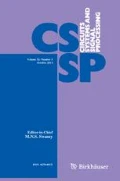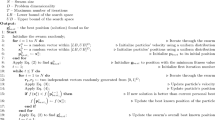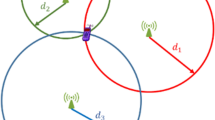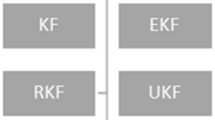Abstract
To reduce the computational complexity and enhance the convergence rate, this article presents set-membership least mean square adaptive algorithms based on an error-estimation time-varying bound method. The bound is constituted by the estimation error for the previous iteration and a time-varying error adjustment factor. The set-membership (SM) method utilizes the estimation error for the current iteration and the bound to determine whether to update the weight vector. When the estimation error is larger than the bound, the weight vector is updated; otherwise, no updating is required. Then, by utilizing a nonlinear function between the step size and the estimation error, the step size is modified to further enhance the convergence rate. Compared to the traditional set-membership normalized least mean square algorithms, the simulation results show that the proposed algorithms have the following advantages: (1) fast convergence with low computational costs, (2) maintaining low, steady-state mean square error, (3) enhancing noise resistance in low-SNR environments and (4) estimating the SM bound in noisy environments without requiring noise power estimation.



















Similar content being viewed by others
References
G. Alexander, Kronecker Products and Matrix Calculus with Applications (Halsted, New York, 1981)
J. Apolinario, M.L.R. Campos, P.S.R. Diniz, Convergence analysis of the binormalized data-reusing LMS algorithm. IEEE Trans. Signal Process. 48(11), 3235–3242 (2000)
R.C. de Lamare, P.S.R. Diniz, Set-membership adaptive algorithms based on time-varying error bounds for CDMA interference suppression. IEEE Trans. Veh. Technol. 58(2), 644–654 (2009)
R.C. de Lamare, R. Sampaio-Neto, Adaptive reduced-rank MMSE filtering with interpolated FIR filters and adaptive interpolators. IEEE Signal Process. Lett. 12(3), 177–180 (2005)
R.C. de Lamare, R. Sampaio-Neto, Adaptive interference interpolators in multipath channels. IEEE Trans. Veh. Technol. 56(6), 2457–2474 (2007)
R.C. de Lamare, R. Sampaio-Neto, Adaptive reduced-rank processing based on joint and iterative interpolation, decimation, and filtering. IEEE Trans. Signal Process. 57(7), 2503–2514 (2009)
J.R. Deller, S. Gollamudi, S. Nagaraj, D. Joachim, Y.F. Huang, Convergence analysis of the QUASI-OBE algorithm and the performance implications, in Proceedings of IFAC International Symposium on System Identification, Santa Barbara, CA (2000), pp. 875–880
P.S.R. Diniz, S. Werner, Set-membership binormalized data-reusing LMS algorithms. IEEE Trans. Signal Process. 51(1), 124–134 (2003)
G. Fang, S. Qiu, X. Ma, W. Sheng, Y. Han, Robust adaptive beamforming based on fast rank-reducing MVB algorithm, in 2014 3rd Asia-Pacific Conference on Antennas and Propagation, Harbin, China (2014), pp. 317–320
S. Gollamudi, S. Nagaraj, Y.F. Huang, SMART: a toolbox for set-membership filtering, in Proceedings of the European Conference on Circuit Theory and Design, Budapest, Hungary (1997), pp. 879–884
S. Gollamudi, S. Nagaraj, S. Kapoor, Y.F. Huang, Set-membership filtering and a set-membership normalized LMS algorithm with an adaptive step size. IEEE Signal Proc. Lett. 5(5), 111–114 (1998)
L. Guo, Y.F. Huang, Set-membership adaptive filtering with parameter-dependent error bound tuning, in Proceedings. (ICASSP ‘05). IEEE International Conference on Acoustics, Speech, and Signal Processing, Philadelphia, PA, USA (2005), pp. 369–372
L. Guo, Y.F. Huang, Frequency-domain set-membership filtering and its applications. IEEE Trans. Signal Process. 55(4), 1326–1338 (2007)
S. Haykin, Adaptive Filter Theory, 4th edn. (Prentice-Hall, Upper Englewood Cliffs, 2002)
S. He, Z. Yang, G. Liao, Adaptive reduced-rank beamforming method based on knowledge-aided joint iterative optimization. IEEE Geosci. Remote Sens. Lett. 13(10), 1582–1586 (2016)
S. Paulo, R. Diniz, Adaptive Filtering: Algorithms and Practical Implementation, 4th edn. (Publishing House of Electronics Industry, Beijing, 2014)
H. Qing, Y. Liu, G. Xie, J. Gao, Wideband spectrum sensing for cognitive radios: a multistage wiener filter perspective. IEEE Signal Proc. Lett. 22(3), 332–335 (2015)
H. Ruan, R.C. de Lamare, Robust adaptive beamforming based on low-rank and cross-correlation techniques. IEEE Trans. Signal Process. 64(15), 3919–3932 (2016)
L. Wang, R. C. de Lamare, Robust auxiliary vector filtering algorithm based on constrained constant modulus design for adaptive beamforming, in 2010 IEEE International Conference on Acoustics, Speech and Signal Processing, Dallas, TX, USA (2010), pp. 2530–2533
L. Wang, R.C. de Lamare, Adaptive constrained constant modulus algorithm based on auxiliary vector filtering for beamforming. IEEE Trans. Signal Process. 58(10), 5408–5413 (2010)
Y. Wang, L. Huang, Y. Shi, Robust widely linear reduced-rank adaptive beamforming based on joint iterative optimization, in 2014 Fourth International Conference on Instrumentation and Measurement, Computer, Communication and Control, Harbin, China (2014), pp. 366–369
Q. Yang, Y. Zhang, J. Wang, C. Tang, Anti-jamming algorithm based on multistage Wiener filter with variable loading, in 2015 IEEE International Conference on Signal Processing, Communications and Computing (ICSPCC), Ningbo, China (2015), pp. 1–4
S. Zhang, J. Zhang, Set-membership NLMS algorithm with robust error bound. IEEE Trans. Circuits II 61(7), 536–540 (2014)
S. Zhang, J. Zhang, New steady-state analysis results of variable step-size LMS algorithm with different noise distributions. IEEE Signal Proc. Lett. 21(6), 653–657 (2014)
M. Zhang, A. Zhang, J. Li, Fast and accurate rank selection methods for multistage wiener filter. IEEE Trans. Signal Process. 64(4), 973–984 (2016)
Acknowledgements
This work is supported by National Natural Science Foundation of China (51877141, 51842703).
Author information
Authors and Affiliations
Corresponding author
Additional information
Publisher's Note
Springer Nature remains neutral with regard to jurisdictional claims in published maps and institutional affiliations.
Rights and permissions
About this article
Cite this article
Shu, Q., Zhang, J. & Xu, F. Set-Membership LMS Adaptive Algorithms Based on an Error-Estimation Time-Varying Bound Method. Circuits Syst Signal Process 39, 3711–3736 (2020). https://doi.org/10.1007/s00034-019-01341-5
Received:
Revised:
Accepted:
Published:
Issue Date:
DOI: https://doi.org/10.1007/s00034-019-01341-5




